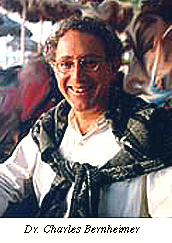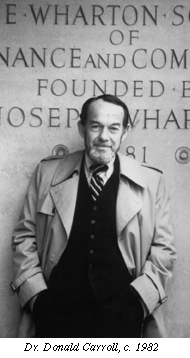Front Page
CONTENTS
Job Ops
CrimeStats
Between Issues
FAQ's About Human Resources' FML Policy
DEATHS
Dr. Bernheimer, a Distinguished Scholar of
Comparative Literature
- Dr. Charles Bernheimer, an influential writer and scholar of Romance
languages and comparative literature here since 1988, died on February
21 at the age of 55. His death, of pancreatic cancer, took place in Berkeley,
California, where he and his wife maintained a home.
- Born in Bryn Mawr on August 16, 1942, Charles Bernheimer was educated at Haverford College, from which he received his B.A. magna cum laude in 1963 with highest honors in English. After studying at Gottingen for a year in 1964, he moved to Harvard for his M.A. (1966) and Ph.D. in comparative literature (1973). Joining SUNY/Buffalo as an assistant professor in 1970, he rose to full professor of English and comparative literature there, and joined Penn as a full professor in 1988.
- During his time here, he served as chair of the Program in Comparative Literature and Literary Theory. He is the author of two books Flaubert and Kafka: Studies in Psychopoetic Structure (Yale 1982) and Figures of Ill Repute: Representing Prostitution in Nineteenth-Century France (Harvard 1989) which is to be published in France in translation under the title Esthétiques de la prostitution: De Balzac à Picasso.
- In addtion to publishing numerous articles and book chapters he was the editor of three other books--one of them entitled In Dora's Case: Freud-Hysteria-Feminism in collaboration with Claire Kahane (Columbia 1985). He was working on a book called Decadent Subjects at the time of his death, and he had just edited, in collaboration with Richard Kaye, a collection of essays entitled The Queen of Decadence: Salome in Modern Culture, which will be published by the University of Chicago Press.
- He was the recipient of many honors and grants including a Guggenheim Fellowship in 1984 and an ACLS Fellowship in 1990.
- Born in Bryn Mawr on August 16, 1942, Charles Bernheimer was educated at Haverford College, from which he received his B.A. magna cum laude in 1963 with highest honors in English. After studying at Gottingen for a year in 1964, he moved to Harvard for his M.A. (1966) and Ph.D. in comparative literature (1973). Joining SUNY/Buffalo as an assistant professor in 1970, he rose to full professor of English and comparative literature there, and joined Penn as a full professor in 1988.
Dr. Bernheimer's work was focused especially on cultural studies and psychoanalytical criticism. He was an active member of the American Comparative Literature Association and was head of the committee that wrote an important report on the state and status of comparative literature in the late twentieth century--a report that resulted in his edited book Comparative Literature in the Age of Multiculturalism (Johns Hopkins 1995).
"Charles Bernheimer was a comparatist in the widest sense of the term," said Dr. Lance Donaldson-Evans, a colleague and chair of the Romance Languages Department. "He was vitally interested not only in the major European literatures and civilizations in which he received his training but also in a wide range of interdisciplinary enterprises including the fine arts and film studies."
He is survived by his wife, Dr. Olga Matich, professor of Russian literature and culture at UC Berkeley; his mother, Gladys Bernheimer and his sister, Cecilia Bernheimer.
The Department of Romance Languages has established an essay prize in his name, and will announce plans for a memorial service at a future date.
Dr. Carroll, Dean of the Wharton School 1972-83
Dr. Donald C. Carroll, dean of the Wharton School from 1972 to 1983, died on February 24 after a long illness. He was 67.
Dr. Carroll was the ninth dean of the Wharton School, and at the time of his selection was the first dean to have come from outside the School. Taking office in time for the implementation of the One University plan--which included transferring economics, political science and sociology to create SAS in 1975--Dr. Carroll led Wharton during changes both physical and programmatic.
Conscious emphasis was given to interdisciplinary programs and inter-school degrees (the master's degree in Management & Technology was a notable one); international outreach (the Wharton/SEAS agreement with Shanghai Jiao Tong broke new ground in 1980); and executive education (where the Wharton Executive MBA program took the lead).
Major physical changes also took place during the Carroll years: The nation's oldest school of business spent its 100th anniversary year in temporary quarters at Blockley Hall (renamed Centennial Hall for the duration) while the venerable Dietrich Hall was reconstructed and a new wing added to create the present Steinberg Hall-Dietrich Hall. The planning of the Steinberg Conference Center was also initiated during Dr. Carroll's tenure.
Donald Cary Carroll was born November 5, 1930, in Chapel Hill, N.C., where his father was for many years dean of the school of business. He attended the Westtown School near Philadelphia and served in the U.S. Marines before taking his B.S. in mathematics at North Carolina in 1954. After additional Marine Corps duty, and service as a consultant to Westinghouse Electric and systems design consultant to Pittsburgh Plate Glass, he earned his master's and Ph.D. in management from MIT.
Dr. Carroll joined the faculty of MIT's Sloan School on completing his doctorate 1965. There he headed the Management Information Systems Group and the Operations Management Group, worked with the time-sharing computer development known as Project MAC, and was principal investigator on the Boeing MIT Research Project.
By the time he was chosen to head the Wharton School, Dr. Carroll had become widely known as a lecturer in the U.S. and abroad, and as the author of numerous technical publications.
A Sloan Fellow, Ford Fellow, and member of Phi Beta Kappa and many other honorary societies, Dr. Carroll was also the first to hold the Wharton School's Reliance Professorship, established in 1979 to endow the deanship.
He is survived by his wife, Carol Gassert Carroll, former director of the Executive Education Program; by children Curtis and Leah Carroll and Debi Gassert Jabkowski; a sister, Eleanor Roberts and brother, Elliott Carroll; and three grandchildren.
A memorial service is to be held on campus later this spring, and the
family ask that any memorial contributions in his name be made to the Wharton
School.
Return to: Almanac, University of Pennsylvania, March 3/10, 1998, Volume 44, Number 24